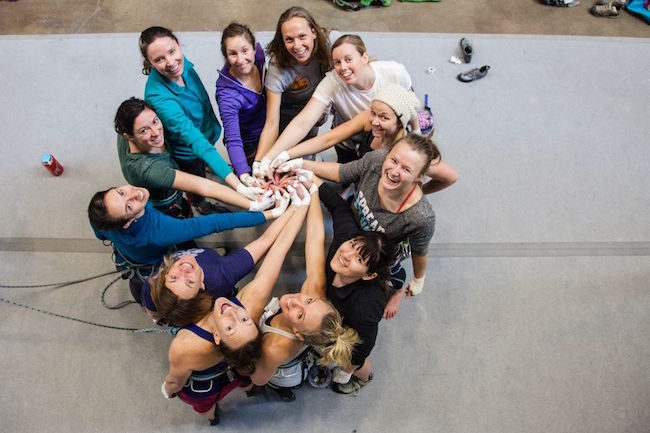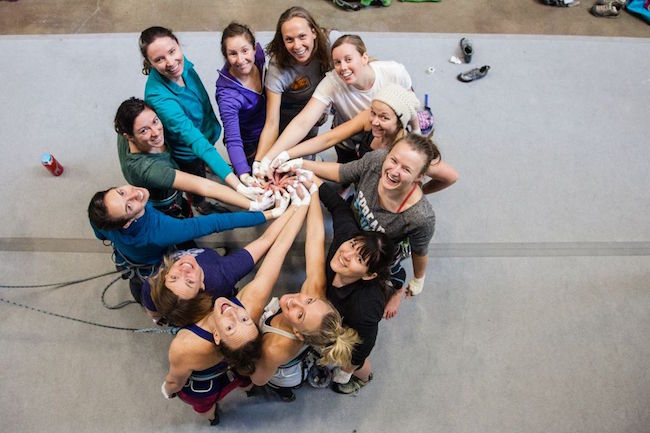
By Abree Murch
The female climbing community is having a moment. Earlier this summer, REI launched their nationwide Force of Nature initiative to support women in the outdoors and showcase their achievements with thousands of events. Their partner in this campaign, Outside Magazine, in direct response to subscriber requests, dedicated their May issue to women. As the climbing industry grows, so does the population of women visiting and joining climbing gyms. So how can gym owners and operators support and build their female climbing community?
Why Women’s Night
Historically, climbing has been a male-dominated sport. For many gyms, it still is, when it comes down to raw numbers. “Just in general, looking at the demographics of who comes in and climbs, you certainly have a stronger base of men,” explains Zach Barber, co-owner and manager of the newest Gravity Vault facility in Radnor, PA. “I don’t think there’s any denying that.”
At its core, a discount is a way to get more women in the door. All Gravity Vault locations currently offer a Ladies’ Night discount on day passes and belay classes after 5 pm every Friday. This type of weeknight special is a staple for many other gyms as well. Barber, who has been with Gravity Vault in varying capacities since 2009, cites the discount as a financial incentive born from a desire to build community. “This is a special we’ve been running for as long as I’ve worked for the Gravity Vault,” he told CBJ. “It’s a nice way of building a community that comes in on Fridays.”
Recently, a group of nine moms came into Radnor on a Friday to take the discounted belay class together. “They wanted to be able to belay their kids, so they came in, took the class, and then went out to the wine bar,” Barber explains. “Rock climbing is a social sport, so if we can offer a Ladies’ Night, I think that benefits all.”
However, despite the general success of these specials, some have mixed feelings about women-only discounts, including female climbers themselves. Elena Coleman, who has worked at multiple climbing gyms and currently leads a gym-sponsored women’s group in New Hampshire, isn’t sure about them. “I get a lot of women asking about it and it’s a nice way to encourage new women climbers to come on women’s nights. But I also feel conflicted about giving discounts based on sex, especially with the purpose of making a profit,” she admits. Krista N., a climber from Virginia, points out that “having women pay less money for the same service seems unfair and a little patronizing.” Alma Baste, a blogger and climber from Georgia, flat out rejects discounts as not only unfair but demeaning. “It’s only turning us into a product by giving us a monetary incentive to show up at the gym – think ladies’ nights at a nightclub where we get in for free,” she explains.
A Popular Alternative
It’s still possible for gym owners and operators to support their female climbing community without offering a monetary incentive. Many gyms choose to forgo the women’s night discount completely – though whether this is due to pricing structure or a desire to avoid potential legal trouble is unclear. Outside of discounts, women-specific climbing groups are another popular option and are increasing in number, primarily due to popular demand.
Members at Gravity Vault Radnor approached management directly and voiced a desire for a women’s climbing group. “Members have asked if they could start it, and we’re totally encouraging in that type of situation,” Barber elaborates. “They’re going to create Facebook groups for our area and really encourage other women who might be nervous about starting, or who just need more experience, to come in and climb with them, creating a little community group within our gym.”
Many women cite a desire for the camaraderie that comes from climbing with other women as their primary reason for joining these groups, like Rachael Holmes, a climber from Maryland who participates in her gym’s women’s climbing group on occasion. “I think women-only climbing groups are a great way to nurture female climbers,” she says. “There is an attitude of sharing of skills and support that I haven’t found elsewhere in life.” Caitee S., also from Maryland, finds “getting beta or any pointers from women tends to be more beneficial for me personally.”
This practical side of climbing with like-minded people in a more structured environment is what drew Melina S. to Never Stop Moving, a women’s training group based out of Stone Gardens in Seattle. “The vibe was very different, all the women genuinely wanted each other to improve,” she explains. “They weren’t concerned about who was the better climber, they just wanted to work together and improve as a group. I also enjoyed how I could focus more on technique and not just checking off what route I had completed.”
A New Movement
Never Stop Moving is an example of how these member-run groups have the potential to become something even bigger and more far-reaching than their creators ever imagined. When Megan Fritz moved to Seattle, WA, in October of 2015, she wanted to generate a way to meet climbing peers with similar training goals. “What I was looking for when I moved here was a group of women to climb with that were intending to become better, and were actively working towards that and wanted to do that with me,” she explains.
Fritz decided to buy a copy of the Anderson brothers’ Rock Climber’s Training Manual and invited a few people to meet at the gym every Tuesday at 7 pm. “It kind of just took off after that – I was really surprised at how many people showed up,” she reminisces. “It ended up developing over the last year and a half into something much greater and more intense.” Never Stop Moving now boasts a mailing list of nearly 50 people and meets twice a week to train, with at least one dedicated outdoor weekend per month.
Another successful women’s climbing group got its start at the other Stone Gardens location in Ballard, WA. When Alexis Vergalla co-founded She Rocks, it was based on a broad desire to simply connect women climbers. “It eventually evolved into a monthly climbing night at the gym, and then food and beer or whatever afterward,” Vergalla explains. “It’s more of a social thing than a training thing.”
The response from the community was so great that she eventually had to scale her own involvement back to Stone Gardens Ballard, passing off the responsibility of hosting satellite events to willing climbers at other gyms. Now, She Rocks serves a community that extends from Seattle throughout the greater Pacific Northwest and into Canada. They’ve also partnered with REI to host Force of Nature events in the Seattle area.
“I run into women when I’m out climbing and they see the She Rocks sticker and they’re like “Oh, you’re part of the group! I haven’t seen you at any of our nights, when did you find out about it?’” Vergalla laughs. “And then I’m like, ‘Well, I kind of run it, so, yeah, I know about it.’ I love the fact that it’s bigger than just me.”
Building Community in the Gym
While both discounts and climbing groups offer gym owners and operators the opportunity to build a stronger female climbing community, the demand for groups is strong and growing. Member-run climbing groups are a way to allow the community to rise up and facilitate itself with very little gym intervention. Neither She Rocks nor Never Stop Moving are directly sponsored by their respective Stone Gardens locations, but the gyms do allow them to post flyers and host events.
Whether a women’s group is gym-sponsored or member-run, program coordinators should still be wary of creating too much separation, one of the most common objections to women-specific programming that came up in the process of writing this article. One female climber from Maryland voiced her frustration with how women’s climbing nights are advertised and run: “Often the advertisement is about not being scared of climbing/bouldering or the gym is offering a completely closed off section of the gym to the women participating. This to me creates distance.”
There are also some that label women’s climbing groups as exclusionary. Vergalla has been challenged outright on the subject. “This is a space we’re creating for women, and we’re not saying you can’t ever climb with these people, but in this two-hour chunk, on this Thursday night, these women are trying to climb with other women,” she explains. “If you want a men’s climbing night, you’re empowered to go organize that.” She says these types of conversations happen less now that She Rocks has gotten off the ground. “For the most part, people are all really respectful.”
Fritz’s sentiments echo Vergalla’s: “I’m from Boston and I’m really straightforward. I’ll ask for what I want, hence why I created Never Stop Moving. We’re all just trying to do what we like, and we should support each other in doing that.”

Climbing Business Journal is an independent news outlet dedicated to covering the indoor climbing industry. Here you will find the latest coverage of climbing industry news, gym developments, industry best practices, risk management, climbing competitions, youth coaching and routesetting. Have an article idea? CBJ loves to hear from readers like you!







